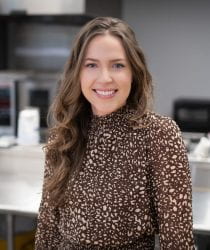UW-Green Bay Master of Science in Nutrition & Integrated Health graduate students look to transform nutrition and health science.
Is intermittent fasting for me? Is it best to eliminate carbohydrates or fats? How does my family history play into my current health? If I’m thin, I’m healthy, right?
The questions—and the answers—are coming fast and furious for Americans regarding optimum health. The research and the science behind health and wellness is flying at consumers at a record pace. How does one know where to turn?
Deb Pearson, Ph.D., UW-Green Bay associate professor and director of the Master of Science in Nutrition & Integrated Health graduate program, can introduce you to some exceptionally passionate people who can help sift through the answers. They are Registered Dietitian Nutritionists (RDNs).

RDNs are trained specifically to counsel patients on diet and nutrition needs. Whether it’s developing a specific eating and exercise plan or facilitating a group of patients on their best choices for nutrition, RDNs use evidence-based research to help people understand their own best options for nutrition and living a healthy life.
Student Faith LaFramboise is excited about her career choice. “I have always loved wellness in its physical, mental, and spiritual forms. I also really nerd out when it comes to the body’s physiology, metabolism, and learning the nuances of our biology in relation to nutrition and its effects on the physical, mental, and spiritual state of a person,” she explains.
Pearson said the program is constantly adapting.
“The healthcare field is moving more and more into personalized or precision healthcare—healthcare matched more to each individual,” Pearson says. “Nutrition and food—how and what we eat—none of us are untouched by it. It is a field that easily lends itself to lots of good information—and lots of misinformation.
“It’s a field that is expanding and evolving as new research seems to come out monthly. That can be both exciting and frustrating. That’s why our program also focuses on the research arena and scientific methods to tease everything out.
“Healthcare should be evidence-based, and what your dietitian and physicians suggest should be evidence-based,” she says.
Pearson said she is confident in her faculty and the program.
“I can say that we really pride ourselves in this program in keeping up with the current research literature,” Pearson said. “Whether it be the latest research on heart disease or type 2 diabetes, nutrition in cancer therapy, or the concept of nutrigenomics—matching nutrition choices based on each person’s individual DNA—there is a movement for integrated medicine. Especially in the world of nutrition and lifestyle, it isn’t enough just to know fruits and vegetables, but a combination of factors including stress level, physical activity, social engagement, etc.”

Classes are experiential and context-based, recognizing that health is more than what you eat. Students learn about and apply research to stay at the cutting edge of evidence-based nutrition practice. “Our students not only learn the latest research, but that it is just as much about changing attitudes, and the science behind operationalizing and affecting behavioral change,” says Pearson.
“I have found my niche to say the least, adds LaFramboise. “I adore my classes here and the professors!” The Auburn, Michigan native will graduate in May of 2024 with her Master of Science in Nutrition & Integrated Health, complementing a bachelor’s degree in exercise physiology. “Coupled with nutrition, the two subjects go hand-in-hand.”
LaFramboise, hopes to one day pursue her Ph.D. in the nutrition field, so that she can research mental health and how nutrients may play a role in this area of wellness.
“Clinically, I hope to work in the disordered eating and behavioral health setting,” LaFramboise said. “I work and study daily to address the hurt I can’t stand to see in the world. I, myself, experienced a time in my life where I resorted to these behaviors as a coping mechanism—this also nudged me into the field. Empathetically, I am prepared for this facet of my career, coupled with the teachings at UW-Green Bay, I know I will be well equipped to disseminate education and help those that are struggling.”
Find more information about the program at the MS Nutrition and Integrated Health website or contact Deb Pearson at pearsond@uwgb.edu.


